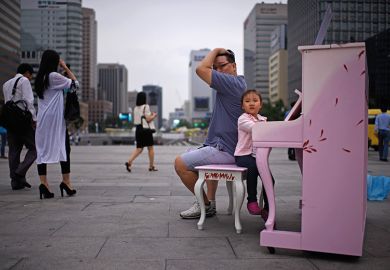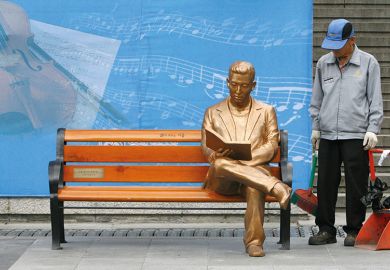South Korea’s decision to eliminate admission fees for undergraduate applicants in 2023 could leave institutions with “no choice” but to raise tuition costs, despite their aim of increasing access to university.
While some universities already phased out admission fees in 2022, by December more than 40 per cent of them had yet to do so. Planned for several years, the move is meant to “ease the burden on college students and parents”, according to Korea’s national education committee.
Students in the country typically pay around 647,000 won (£422), with higher private university fees sometimes costing upwards of 1 million won.
While a move to cut admission fees has the potential to alleviate the “financial burden” on students, the decision could result in costs simply being shifted into regular student fees as universities scramble to recoup money they can no longer charge applicants, some scholars feared.
“They will have to increase tuition. No choice,” said Jun Yoo, a professor in the department of Korean language and literature at Yonsei University.
“The problem in South Korea is that universities do not have large endowments compared to the US, and so charging admission fees is key for defraying the high costs of maintaining the campus, staff, salaries of faculties [and] other expenses,” he said, adding that South Korean tuition fees were still “a bargain” in comparison with the West.
To avoid raising tuition fees, Korean universities would have to make cutbacks elsewhere, potentially reducing staff and becoming more conservative in their spending, said Professor Yoo.
He noted that already institutions are contending with increased costs, including a four-decade high in electricity prices. Yonsei University, arguably the nation’s most prestigious university, faces additional pressure, being “mired” in pay negotiations, with annual strikes by custodians and language instructors calling for higher wages.
Without the “cushion” of admission fees, Professor Yoo questioned whether institutions would have enough money to induce researchers to maintain their output in high-prestige publications.
“Will they have enough money to offer incentives to faculty to publish more SSCI-indexed articles, given that faculty will have to do more mindless administrative work…and take in more students,” he said.
He believed the government should compensate for any funding shortfall. “If the universities are being forced to give up their admission fees, the Ministry of Education should at least try to subsidise costs.”
Register to continue
Why register?
- Registration is free and only takes a moment
- Once registered, you can read 3 articles a month
- Sign up for our newsletter
Subscribe
Or subscribe for unlimited access to:
- Unlimited access to news, views, insights & reviews
- Digital editions
- Digital access to THE’s university and college rankings analysis
Already registered or a current subscriber?







